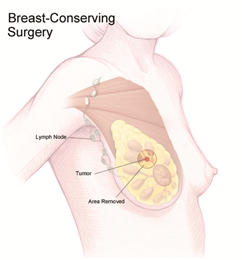Metastatic Breast Cancer
Featured Expert:
Metastatic breast cancer is cancer that has spread (metastasized) to other organs in the body. Another name for metastatic breast cancer is stage IV breast cancer.
Jenna Canzoniero is an oncologist specializing in breast cancer at the Johns Hopkins Kimmel Cancer Center.
“Patients often fear that treatments won’t do any good,” she says. “In fact, there are things we can do to improve both the quality and quantity of life.”
Canzoniero provides the following information on a diagnosis of metastatic breast cancer.
What You Need to Know
- Metastatic breast cancer is treatable with therapies that may decrease symptoms and improve quality of life.
- Breast cancer metastases, when they occur, most often spread to the bones, liver or lungs, depending on the type of breast cancer.
- Approximately 85% of patients diagnosed with metastatic breast cancer have had an early-stage breast cancer diagnosis. However, most patients with early-stage breast cancer do not go on to develop metastatic disease.
- Approximately 15% of patients with metastatic breast cancer are found to have metastatic spread at the time of the initial breast cancer diagnosis. This is called de novo metastatic breast cancer.
Symptoms of Metastatic Breast Cancer
Symptoms depend on where the cancer has metastasized. Common areas include the bones of the spine, the lungs and the liver. Some types, including triple negative and human epidermal growth factor receptor 2 gene (HER2-positive) breast cancers, can also spread to the brain.
People, especially those who have been treated for breast cancer, should watch for symptoms such as:
- Unusual, persistent back or neck pain that is not explained by injury or exercise
- Pain in the bones
- Unexplained shortness of breath or cough
- Profound fatigue or malaise (feeling generally unwell)
- Headache
- Seizures
- Mood changes
- Difficulty with speech
- Vision changes
“Listening to your body ― and reporting any symptoms such as these ― is essential,” Canzoniero stresses. “Patients are usually the first and best people to notice something is not right.
“Keeping up with your follow-up appointments with your primary doctor, your medical oncologist and your surgeon is a good way to stay ahead of any changes.”
Diagnosing Metastatic Breast Cancer
Canzoniero explains that checking for breast cancer metastasis is determined by symptoms.
“Your doctor will not perform regular whole-body scans but will follow up with tests if you report changes to your health,” she says. Those tests may include the following:
Blood Tests
“Although there is not a blood test that confirms the presence of recurring cancer, a blood test may be part of the work-up to spot clues pointing to metastasis,” Canzoniero says.
- A complete blood count (CBC) assesses your bone marrow function.
- Tests for minerals and enzymes (serum biochemistry) can provide evidence of spreading cancer or other conditions.
- Tests for certain proteins may detect the presence of cancer (biomarkers).
Imaging Tests
- Bone scan
- CT scan
- Positron emission tomography (PET) scan (or PET/CT scan)
- MRI
Preventing Metastatic Breast Cancer
“If you have been treated for breast cancer, the most important way to avoid developing metastatic breast cancer is to follow your treatment plan,” says Canzoniero. “For instance, if you are taking endocrine therapy for estrogen-receptor positive breast cancer ― the most common type ― completing the full course gives you the best chance of avoiding a recurrence.”
Canzoniero also notes that maintaining a healthy lifestyle, including staying at a healthy weight, exercising regularly and limiting alcohol, can help reduce the chance of breast cancer coming back or spreading.
“To prevent de novo metastatic breast cancer, the best strategy is to stay on schedule with screening mammograms as your doctor directs,” she says. “Also, if you experience breast symptoms such as a lump or discharge, don’t wait — contact your doctor right away. Breast cancer that is discovered at an early stage, before it has spread, is easier to treat.”
Metastatic Breast Cancer Treatment
Metastatic breast cancer is treated with systemic therapy — medicines that enter the bloodstream and reach the entire body. Therapy may be able to slow the spread of cancer, lessen the impact of symptoms, or both.
A treatment plan for addressing systemic metastatic breast cancer is tailored to the individual. Metastatic breast cancer can be any of several types, with varying symptoms and behavior patterns in each person. This means the best choice for one situation may not be appropriate for another.
“We’ll start with one treatment regimen and use that as long as it’s working without too many side effects,” Canzoniero says. “We use lab tests and imaging scans to see how the cancer is responding. If the cancer stops responding to a treatment, or the side effects are not manageable, then we switch to the next treatment regimen. Some patients can stay on a regimen for months or even years.”
Systemic therapies may include:
- Chemotherapy, which is used to suppress and stop the growth of the cancer and kill the cancer cells
“For patients receiving chemotherapy, it is very common to be treated with more than one medicine,” Canzoniero says. “Sometimes, the cancer can mutate so that a chemotherapy drug no longer works to control it. If one form of chemotherapy stops working, your doctor will likely be able to try another.”
- Endocrine therapy, which uses hormones to address breast cancer cells that are hormone-receptor positive, meaning the cells are sensitive to estrogen or other hormones
- Drugs that target proteins in certain cancer cells such as HER2 that help the cells divide, form tumors and spread
- Immunotherapy for breast cancer, which uses the body’s immune system to identify the cancer cells as invaders and fight them
Local therapy: Examples of this approach include surgery and radiation directed at one or more specific spots where breast cancer has spread. Canzoniero explains that this approach is palliative, which means it is designed to help ease symptoms due to cancer in a particular area but it will not completely remove the cancer.
Local therapy can address oligometastatic (OH-li-go met-a-STAT-ic) breast cancer, which is cancer that has spread to just one spot or to a limited number of areas.
Advanced Metastatic Breast Cancer
Patients with metastatic breast cancer may have pain or other symptoms that interfere with quality of life. Doctors may work with experts in palliative medicine or integrative health to help maintain quality of life for as long as possible.
“We’re trying to alleviate cancer symptoms without causing intolerable side effects,” Canzoniero says. “We want to prolong not just length of life, but also quality of life, and ensure each patient is benefitting from treatment we’re offering”
What is the prognosis for stage IV breast cancer?
Unfortunately, metastatic breast cancer cannot be completely resolved, but it is treatable. Some types, subtypes and mutations of the cancer cells respond well to therapy, allowing patients to live longer and with less impact of symptoms.
Targeted therapies show particular promise. Canzoniero says in recent years, more targeted breast cancer drugs have been developed, and treatment options for metastatic breast cancer are becoming increasingly personalized. This means more patients may respond well to therapy.
“There’s a lot of hope,” Canzoniero says. “The field is exploding, with a number of promising advancements and effective new drugs developing over the past five years.
“It’s amazing what we can treat now. Ten years ago, people with HER2-positive breast cancer had very poor prognosis, and now with treatment, patients are living for five and 10 years beyond diagnosis.”







